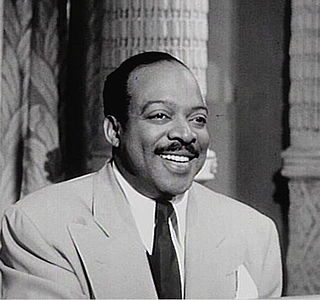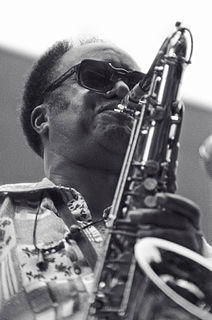
William James "Count" Basie was an American jazz pianist, organist, bandleader, and composer. In 1935, Basie formed his own jazz orchestra, the Count Basie Orchestra, and in 1936 took them to Chicago for a long engagement and their first recording. He led the group for almost 50 years, creating innovations like the use of two "split" tenor saxophones, emphasizing the rhythm section, riffing with a big band, using arrangers to broaden their sound, and others. Many musicians came to prominence under his direction, including the tenor saxophonists Lester Young and Herschel Evans, the guitarist Freddie Green, trumpeters Buck Clayton and Harry "Sweets" Edison, plunger trombonist Al Grey, and singers Jimmy Rushing, Helen Humes, Thelma Carpenter, and Joe Williams.

Joe Williams was an American jazz singer. He sang with big bands such as the Count Basie Orchestra and the Lionel Hampton Orchestra and with his combos. He sang in two films with the Basie orchestra and sometimes worked as an actor.

Frank Wellington Wess was an American jazz saxophonist and flautist. In addition to his extensive solo work, Wess is remembered for his time in Count Basie's band from the early 1950s into the 1960s. Critic Scott Yannow described him as one of the premier proteges of Lester Young, and a leading jazz flautist of his era—using the latter instrument to bring new colors to Basie's music.

James Andrew Rushing was an American singer and pianist from Oklahoma City, Oklahoma,U.S., best known as the featured vocalist of Count Basie's Orchestra from 1935 to 1948.

Neal Paul Hefti was an American jazz trumpeter, composer, and arranger. He wrote music for The Odd Couple movie and TV series and for the Batman TV series.

"Fly Me to the Moon", originally titled "In Other Words", is a song written in 1954 by Bart Howard. Kaye Ballard made the first recording of the song the year it was written. Frank Sinatra's 1964 version was closely associated with the Apollo missions to the Moon.

Lester Willis Young, nicknamed "Pres" or "Prez", was an American jazz tenor saxophonist and occasional clarinetist.

The Count Basie Orchestra is a 16 to 18 piece big band, one of the most prominent jazz performing groups of the swing era, founded by Count Basie in 1935 and recording regularly from 1936. Despite a brief disbandment at the beginning of the 1950s, the band survived long past the Big Band era itself and the death of Basie in 1984. It continues as a 'ghost band'.

Cleveland Josephus Eaton II was an American jazz double bassist, producer, arranger, composer, publisher, and head of his own record company in Fairfield, Alabama, a suburb of Birmingham. His most famous accomplishments were playing with the Ramsey Lewis Trio and the Count Basie Orchestra. His 1975 recording Plenty Good Eaton is considered a classic in the funk music genre. He has been inducted into both the Alabama Jazz Hall of Fame and the Alabama Music Hall of Fame.

Frank Benjamin Foster III was an American tenor and soprano saxophonist, flautist, arranger, and composer. Foster collaborated frequently with Count Basie and worked as a bandleader from the early 1950s. In 1998, Howard University awarded Frank Foster with the Benny Golson Jazz Master Award.

John Lee Clayton Jr. is an American jazz musician, classical double bassist, arranger, and composer.

Grover Mitchell, born Grover Curry Mitchell was a jazz trombonist who led the Count Basie Orchestra.

Ernest Brooks Wilkins Jr. was an American jazz saxophonist, conductor and arranger who spent several years with Count Basie. He also wrote for Tommy Dorsey, Harry James, and Dizzy Gillespie. He was musical director for albums by Cannonball Adderley, Dinah Washington, Oscar Peterson, and Buddy Rich.
William Mitchell Byers was an American jazz trombonist and arranger.

Have a Nice Day is a 1971 studio album by Count Basie and his orchestra, with all music composed and arranged by Sammy Nestico.
William Henry Hughes was an American jazz trombonist and bandleader. He spent most of his career with the Count Basie Orchestra and was the director of that ensemble until September 2010.

Bing 'n' Basie is a 1972 vinyl album recorded for Daybreak Records by Bing Crosby, accompanied by Count Basie and his Orchestra. The orchestral tracks were laid down over three days at the end of February and the beginning of March, 1972 at Amigo Studios, North Hollywood. Crosby added his voice to the pre-recorded orchestral tracks during three sessions on March 14, 15 and 16, 1972 at Coast Recorders Studio, Bush Street, San Francisco. Bing Crosby also added his voice to "If I Had a Hammer" and while this has appeared on pirate issues it has never been commercially released.
Easin' It is a studio album by Count Basie and his orchestra recorded between 1960 and 1962. The album contains a collaboration by Frank Foster, a well known member from Basie's big band. All tracks were composed, arranged and conducted by Foster and is a mixture of jazz and blues.

Basie Meets Bond is a 1966 album by Count Basie and his orchestra. The album is a collection of musical pieces from the first four James Bond films; Dr No, From Russia with Love, Goldfinger and Thunderball. The album was Basie's first for United Records, and was produced by Teddy Reig.

Basie Reunion is an album by Count Basie Orchestra members led by jazz saxophonist Paul Quinichette featuring tracks recorded in 1958 and released on the Prestige label.
The first two tracks are correctly identified on the CD reissue; the original LP issue has the titles reversed. In 1982, Prestige issued this session as a gatefold LP paired with For Basie as Basie Reunions; this issue also has the track titles reversed.

















